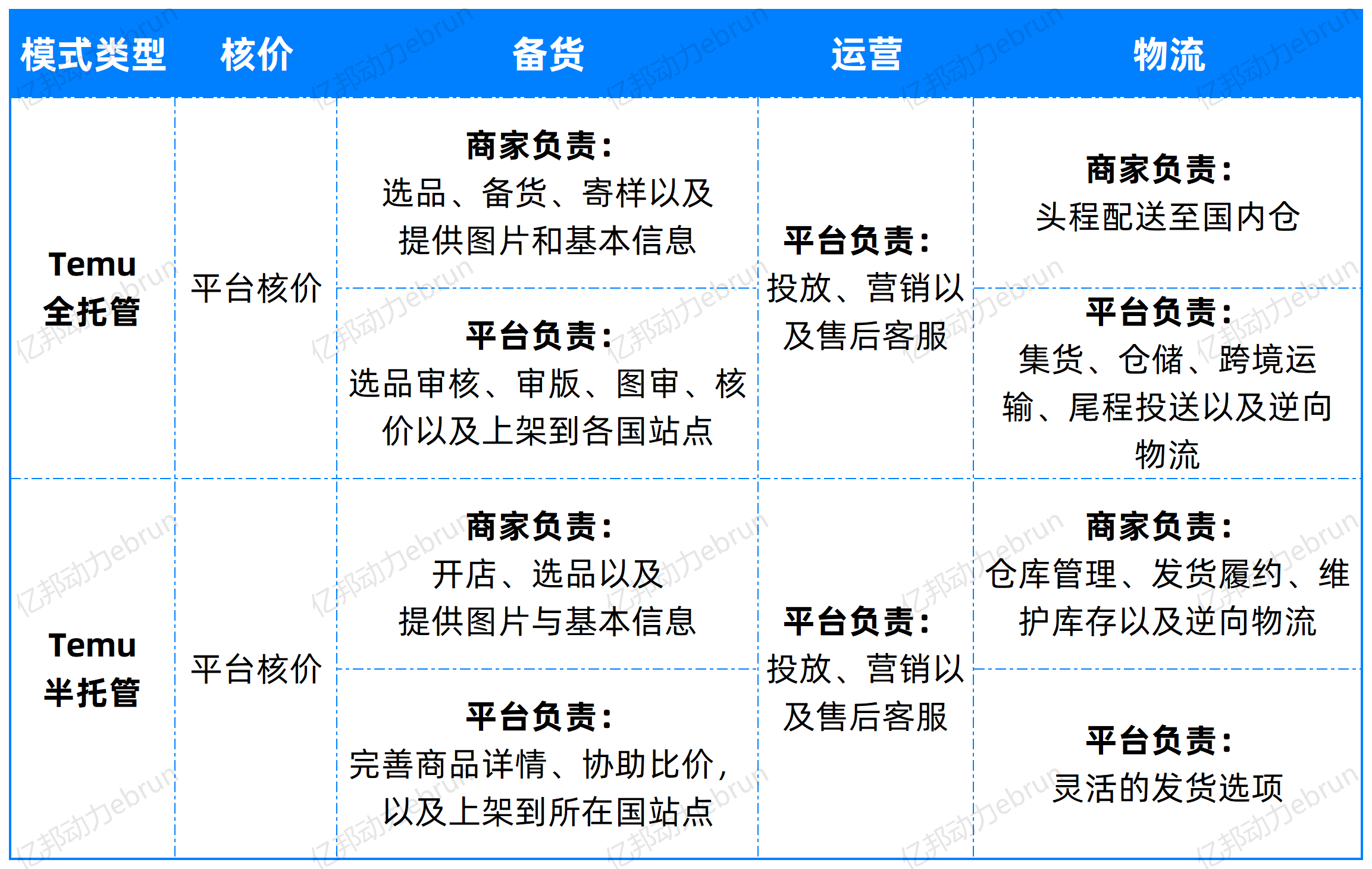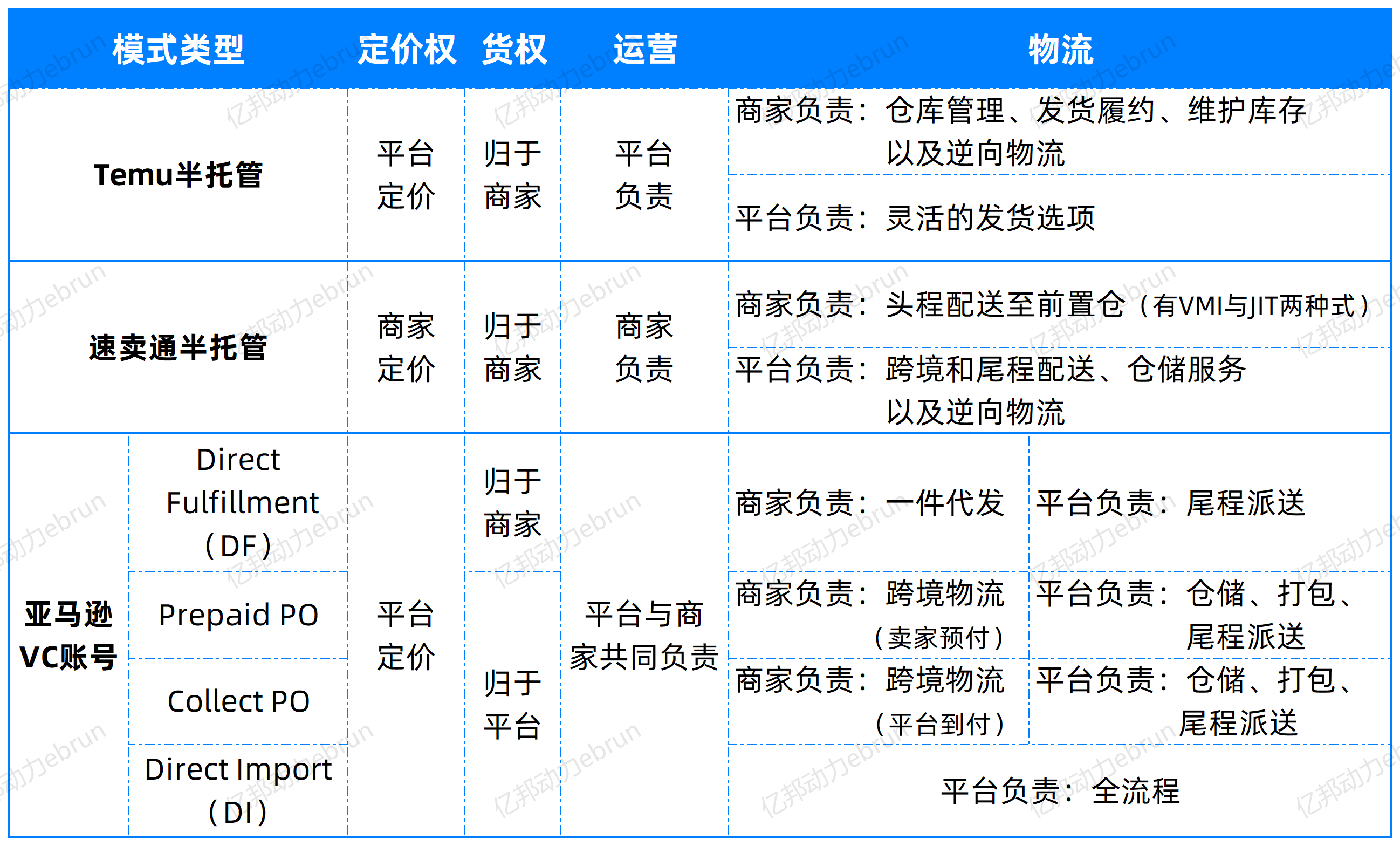Temu kicks off the new year! What are the changes and opportunities brought by the birth of "Semi-Managed" mode?

By Wang Yu; Edited by He Yang
Temu, which single-handedly set off the boom of "Fully-Managed" cross-border e-commerce, has always been the focus of the industry since its establishment.
As soon as 2024 began, news of "Temu will launch a new mode apart from full management" spread widely in the cross-border circle, attracting the expectation of many merchants for the mode to be implemented as soon as possible.
Recently, an insider revealed to Ebrun that Temu is about to introduce the "Semi-Managed" mode, allowing existing fully managed merchants to choose semi-management, providing all new and old merchants with an additional option. "The policy may not be introduced until March. The plan is to first go live on the U.S. site, followed by major European sites."
More specifically, merchants stocked in overseas warehouses (including new and existing merchants) can independently decide warehousing and logistics solutions based on orders (without the platform being fully responsible for cross-border logistics and end delivery), and reduce the procedure of merchandise selection. Apart from this, it is no different from fully managed mode. The platform will still be responsible for operating goods, assisting in price comparison, marketing promotion, and customer service.
For merchants who want to use Temu to develop their cross-border business, there is no longer just one path of fully managed mode; "Semi-Managed" is a more flexible cooperative option.
When Temu, which is surging ahead, has become the undisputed leader of factory's "going global" through full management, what impact will the introduction of "Semi-Managed" have on the industry? In the high-speed growth phase, where will this giant ship of overseas expansion sail to?
01
Entering the era of "Semi-Managed"?
What changes does Temu's new mode bring?
It is reported that the main targets of Temu's semi-managed service are cross-border merchants who have partnered with overseas warehouse logistics providers, have overseas entities, and have mature local fulfillment capabilities. They can complete the end-to-end delivery of goods without using the officially recommended warehouse logistics solution.
"The 'Semi-Managed' launched by Temu this time is still a cooperative plan based on the existing fully managed mode, which is far from traditional 'third-party self-operated merchants'." The insider pointed out.
Compared to fully managed mode, the biggest difference of semi-managed mode lies in the flexibility of warehousing and logistics, allowing more mature merchants to continue their original fulfillment plan. Other links are still in managed mode, and the pricing mechanism remains similar to the original.

Ebrun has learned that in Temu's semi-managed mode, merchants can choose to manage warehousing and distribution themselves, complete the goods fulfillment, while the platform can provide flexible shipping options (single/multiple combined shipments).
In contrast, fully managed mode only requires merchants to distribute goods to Temu's domestic warehouse in Guangdong. The platform also gives recommended logistics solutions and corresponding freight subsidies.
In terms of merchandise selection, the process under the semi-managed mode has been greatly simplified. Merchants can skip several steps such as merchandise selection, sample delivery, trial version, and image review, and directly put overseas warehouse goods on sale. However, subsequent operational matters such as detail page editing, price setting, marketing, and after-sales service are still handled by the platform.
Overall, Temu's semi-managed mode can be seen as a "new species", radically different from the "semi-managed" modes on platforms such as AliExpress and Ozon. For example, AliExpress's semi-managed mode tends to be close to the "POP" mode, where ownership, pricing, and operation rights are owned by the merchant, only transferring logistics and fulfillment services to the platform. On the other hand, Temu's semi-managed mode is more like a "youth version" of classic full management mode.
Another often compared model with "semi-managed" is Amazon's VC account (Vendor Center). However, the biggest difference between it and Temu's semi-managed mode is that for merchants using the PO/DI (Purchase Order/Direct Import) shipping mode, the platform is responsible for both inventory rights and end delivery, while the merchant still needs to pay promotion fees and a series of other fees (such as Slot Fee). Conversely, Temu's semi-managed merchants do not need to pay any commissions/service fees to the platform, making it more advantageous.

"Compared to the one-stop operation of fully managed mode, semi-management's greatest value is giving all new and old merchants an additional choice." A merchant said, "Sellers can choose a nanny-style fully managed service based on their own capabilities, or choose a more flexible semi-managed service when they have overseas shipping capabilities, allowing them to give full play to their overseas resources."
02
"The real-to-real" era has arrived
Who can seize the new opportunity?
"In fact, 'real-to-real' is more like a common shift of the entire cross-border track." An industry insider commented, "Cross-border e-commerce is moving towards localization, a paradigm shift directed by stock competition in the post-epidemic era. Whoever can better establish footholds locally and provide local service can grab more market share."
It’s not without basis. TikTok, AliExpress, SHEIN, all part of the "four little dragons" going global, have all stepped up efforts on "localization capabilities" - setting up local stores, laying out local supply chains, and accelerating delivery cycles through local stocking. Platforms are competing fiercely in localizing basic infrastructures, especially in terms of logistics and fulfillment. This battle of localization among platforms is picking up speed. And this trend will open up broader growth space for merchants and provide more precise business opportunities.
Temu's semi-managed mode is the latest gateway to share the rapid growth dividends with more merchants.

If the previous fully managed mode offered an efficient overseas path for factory-type merchants, this new move aims to unite more mature merchants with deeper local resources and more local service capabilities.
"The monthly independent visit to Temu has surpassed many old platforms, claiming the world's second position, such a huge traffic used to be the exclusive area of factory-type merchants. Meanwhile, relying on full management, which is a 'throw-and-hold' partnership model, has also given more novices a chance to advance." One industry insider pointed out, "Many mature merchants also want to have a share. The semi-managed mode is a rare opportunity."
This is not only a new source of orders, which can provide significant incremental gains, but also an opportunity for merchants to reshape business rhythms. "Temu's rapid turnover helps us test new styles more efficiently, relocate inventory, and improve overall turnover rate; moreover, against the backdrop of multi-platform operations, Temu’s extensive promotions, along with long-lasting year-end promotions, can complement the pace of promotions on other platforms, providing merchants with nearly 'Black Friday throughout the year' long-term explosion." A senior cross-border merchant expressed optimism about participating in Temu's semi-management.
Some categories that were difficult to operate with direct shipping from China under a fully managed mode will find growth opportunities at Temu as soon as "Semi-Managed" is available.
For example, a business selling large products told Ebrun Power, "Before, we were envious of Temu's dividends, which are also available to those who sell large products." And the "business-to-business delivery" model launched this time undoubtedly removes obstacles to furniture, household appliance, and other large-item products (which are often kept in overseas warehouses) from entering Temu, and takes Temu a further step towards being a "comprehensive platform".
In addition, "business-to-business delivery" not only brings benefits to businesses, but also brings huge volume gains to Temu, which will lead to continuous growth for logistics service providers offering comprehensive fulfillment services, allowing the dividends of the platform to spill over to more links in the industry chain.
03
Firing the first shot in 2024
"What is the strategic significance of 'semi-managed'?"

The emergence of the semi-managed model not only means a larger "united front" for Temu, known for its "stability, accuracy, and strength", but also seems to reveal deeper strategic motives.
The most notable point is that the semi-managed model will be an important measure to speed up logistics fulfillment.
As a rising star, logistics fulfillment has always been a key direction of development for Temu. Since its establishment, Temu has continuously expanded its list of logistics service provider partners, expanded its warehousing capacity, and established logistics fulfillment centers overseas.
Currently, Temu's last-mile delivery mainly depends on service purchases from local logistics service providers (such as UPS and USPS), while semi-management can effectively release the seller's own logistics resources to better serve local consumers.
Attracting more players through the semi-managed model will bring not only accelerated fulfillment, but also optimization of the product structure.
For mature sellers who are familiar with local e-commerce operations, most of the inventory in their overseas warehouses is focused on long-term standard products, which are of high quality, and many are sought-after "hot items" with higher market value. Many of these businesses have entered the market as overseas brands, with their own traffic and fans.
For Temu, which has long focused on "cost-effectiveness", the addition of these new forces will undoubtedly help the platform increase product richness, add product levels, optimize category structure, and increase the average customer transaction value.
The deeper change brought by this is the improvement of consumer awareness. "Consumers will find that Temu not only offers extremely low prices, but also takes care of high-quality and enjoyable purchasing experiences," said one seller.
A reference case is Pinduoduo's verified strategy in the domestic market: driving traffic with high-quality branded products, driving associated sales, and thriving the internal ecosystem. In this regard, after the launch of the semi-managed model, it is intriguing to think about the cooperation details Temu will reach with high-quality, mature sellers.
In addition, the semi-managed model is a continuation of Temu's consistent business logic: Temu's foundation lies in the merchants themselves and in being a helper for companies to go global; the focus of platform business innovation is determined by the merchants' own endowments, development status, and needs, rather than the other way around.
"When the capabilities of platform merchants continue to grow, and they can do more things by themselves, it is natural to give merchants more options and flexibility," a knowledgeable source said. "This will not only enrich Temu's merchant composition, but also allow the platform to manage less, more accurately, and more effectively, providing space for merchants to demonstrate their own endowments."
It can be said that the semi-managed model will bind more companies to Temu, this huge juggernaut of constant progress.
Unite all available strengths, open up dividend entry points. By working with those who have local fulfillment capabilities, Temu will find greater value anchoring points and competitiveness in the international market, thus standing firm in the face of fierce competition, and finding a development path that continues the myth of high-speed growth.
[Copyright Notice] Ebrun advocates respecting and protecting intellectual property rights. Without permission, no one is allowed to copy, reproduce, or use the content of this website in any other way. If any copyright issues are found in the articles on this website, please provide copyright questions, identification, proof of copyright, contact information, etc. and send an email to run@ebrun.com. We will communicate and handle it in a timely manner.
Translated by AI. Feedback: run@ebrun.com
